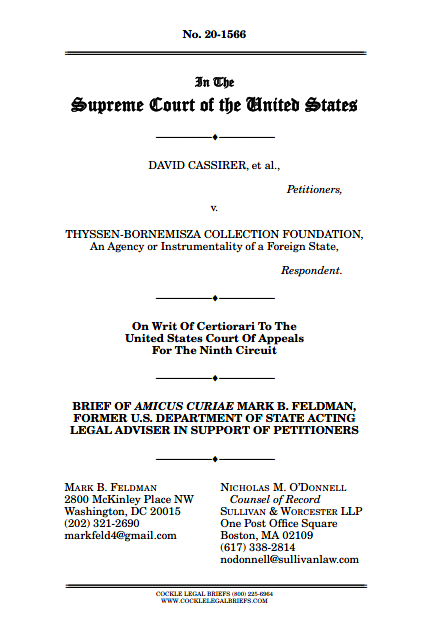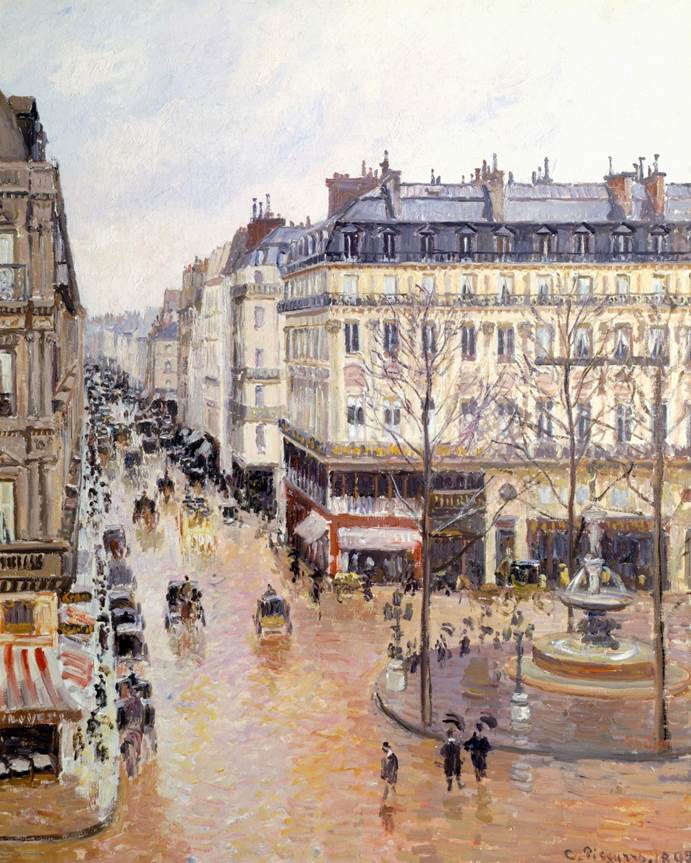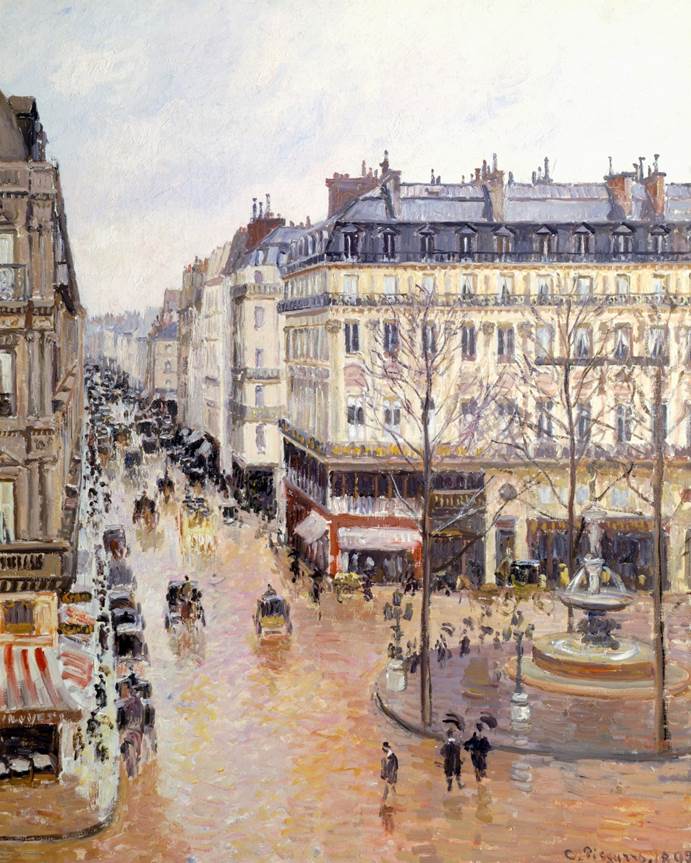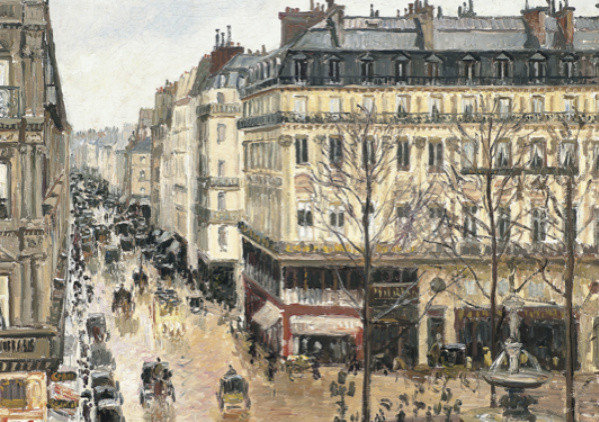Today I am pleased to announce that I have filed a brief in the Supreme Court of the United States as counsel of record for amicus curiae Mark B. Feldman, former U.S. Department of State Acting Legal Adviser. We filed the brief in the case of Cassirer et al. v. Thyssen-Bornemisza Collection Foundation (“TBC”). Cassirer is the long-running dispute over title to Rue St. Honoré, après-midi, effet de pluie (Rue St. Honoré, Afternoon, Rain Effect) by Impressionist painter Camille Pissarro. The painting once belonged to Lilly Cassirer, a Jewish woman in Berlin in 1939, from whom Nazi agents “bought” the painting. The case before the Supreme Court is not about whether the painting was stolen—it is undisputed that it was. Rather, the Supreme Court will review the Ninth Circuit’s decision that Spanish law, not California law, should govern the ownership rights.
Sullivan Files Supreme Court Amicus Brief with former State Department Legal Adviser in Nazi-looted Art Case
Topics: Lilly Cassirer, Foreign Sovereign Immunities Act, Supreme Court, SPK, Stiftung Preussischer Kulturbesitz, Hermann Goering, FSIA, expropriation exception”, sovereign immunity, UNESCO, Rue St. Honoré, Camille Pissarro, Baron Hans-Heinrich Thyssen- Bornemisza, Cassirer v. Thyssen-Bornemisza Collection, Welfenschatz, Jakob Scheidwimmer, Philipp v. F.R.G., Mark B. Feldman
“Moralistic Preening” and Broken Commitments Under the Washington Principles—Ninth Circuit Chastises Spain for Keeping Nazi-looted Pissarro but Rules Painting Will not Return to Cassirer Family
The U.S. Court of Appeals for the Ninth Circuit yesterday affirmed the 2019 judgment that allowed the Thyssen-Bornemisza Collection Museum in Madrid to retain Camille Pissarro’s Rue St. Honoré, après-midi, effet de pluie (Rue St. Honoré, Afternoon, Rain Effect) (1892), a painting sold under duress by Lilly Cassirer to a Nazi in 1939. Absent rehearing by the full Ninth Circuit or Supreme Court review, the decision may bring to an end the Cassirers decades-old effort to win restitution of a painting that no one disputes is Nazi-looted art, yet the museum refuses to return. The result turns on the highly deferential standard of review for findings of fact by the trial court about the state of knowledge by Baron Hans-Heinrich Thyssen-Bornemisza when he acquired the painting in 1976. Yet the Ninth Circuit’s lack of enthusiasm for this result fairly leaps off the page, however, first with its decision to issue an unsigned opinion not for publication, and by seconding the District Court’s disappointment in the ruling under review “that Spain and TBC’s refusal to return the Painting to the Cassirers is inconsistent with Spain’s moral commitments under the Washington Principles [on Nazi-Confiscated Art] and Terezin Declaration.” The Court of Appeals’ statement about Spain and the museum that “It is perhaps unfortunate that a country and a government can preen as moralistic in its declarations, yet not be bound by those declarations” is a reminder of the limitations of these moral imperatives that, ironically, many current possessors argue are sufficient to address the problem of Nazi-looted art. It is absolutely true that moral principles often do not have the force of law. It is equally true, however, that flouting moral principles warrants moral sanction. And as multiple judges of the United States have found, Spain deserves just that.
Topics: Terezin Declaration, Thyssen-Bornemisza Collection, Rue St. Honoré après-midi êffet de pluie, Claude Cassirer, Cassirer, Foreign Sovereign Immunities Act, Washington Principles on Nazi-Confiscated Art, Stiftung Preussischer Kulturbesitz, FSIA, expropriation exception”, Baron Hans-Heinrich Thyssen- Bornemisza, Welfenschatz, A Tragic Fate, Reichskammer der bildenden Künste, Jakob Scheidwimmer, Reich Chamber of the Visual Arts, Madrid
Thyssen-Bornemisza Prevails Over Cassirer Heirs' Claim to Pissarro Taken by Nazis Despite Acts “Inconsistent with the Washington Principles”
One of the longest-running court cases in the United States about art looted by the Nazis has been decided in favor of the current possessor, the Thyssen-Bornemisza Museum in Madrid, an instrumentality of the Kingdom of Spain. The U.S. District Court in Los Angeles ruled on April 30, 2019 against the heirs of Lilly Cassirer, a German Jew whom the Nazis targeted in 1939 for a forced sale of Rue Saint–Honoré, après-midi, effect de pluie (1892). The ruling is the second time that the museum has prevailed in the District Court as the owner of the painting under Spanish law, now on the grounds the museum did not know of the painting’s looting history when it acquired the work and that it held the work publicly for long enough to become its owner even though it had been stolen. The ruling, while favorable to the museum in this case, confirms important principles about the inability of successive possessors to acquire good title to artworks stolen by the Nazis, and the importance of diligence and pursuing questions raised by red flags in the chain of title. Notable as well was the Court’s pointed criticism of Spain for failing to adhere to the spirit of the Washington Principles on Nazi-Confiscated Art, and Spain’s failure to “comply with its moral commitments.”
Topics: Walter Feilchenfeldt, Third Reich, Terezin Declaration, Gestapo, Lilly Cassirer, Claude Cassirer, Jacques Goudstikker, Nazi-looted art, Czechoslovakia, Spain, Washington Principles, Baron Hans-Heinrich Thyssen- Bornemisza, A Tragic Fate, Law and Ethics in the Battle Over Nazi-Looted Art, Reichskammer der bildenden Künste, flight taxes, Rue Saint–Honoré, Julius Cassirer, Paul Durand-Ruel, Ludwigstrasse, Dr. Cassirer and Co. Kabelwerke, Jakob Scheidwimmer, Sydney Schoenberg, Hahn Gallery, Thyssen-Bornemisza Museum, Military Government Law No. 59, Reich Chamber of the Visual Arts, Ari Walter Kampf, Eugen Kampf, Knoedler & Co. Gallery, encubridor
Cassirer and the State of Restitution—Takeaways and Next Steps
I’ve been talking quite a bit to friends, colleagues and clients about the impact of last week’s decision in the Cassirer v. Thyssen Bornemisza case. The New York Times had a follow up article yesterday which was an interesting treatment of the various themes at work in the case and in restitution cases in the United States generally these days. In fact, I think the effect is mostly limited, except to the extent that the decision assumes and treats as uncontroversial important principles about sales under duress and is a case that resolved title under the Foreign Sovereign Immunities Act (FSIA). As we predicted, the Times article makes clear that the museum has absolutely no intention of giving the painting back, but did float the idea of some recognition of the historical circumstances, which is progress (certainly compared to other instances in which obvious circumstances of duress are denied).
Topics: Lilly Cassirer Neubauer, Terezin Declaration, Thyssen-Bornemisza Collection, Rue St. Honoré après-midi êffet de pluie, Jacques Goudstikker, California Code of Civil Procedure § 354.3, Nazi-looted art, Foreign Sovereign Immunities Act, Washington Conference Principles, Bakalar v. Vavra, Fritz Grünbaum, FSIA, adverse possession, expropriation exception”, Restitution, Marei Von Saher, sovereign immunity, Egon Schiele, Jakob Schweidwimmer, World War II, Foreign Sovereign Immunities, Restatement (Second) of Conflict of Laws § 222, Altmann v. Republic of Austria, Camille Pissarro, foreign affairs doctrine, Ninth Circuit Court of Appeals, Museums, Baron Hans-Heinrich Thyssen- Bornemisza, 28 U.S.C. § 1605
District Court Dismisses Cassirer Claim for Pissarro against Thyssen Bornemisza Collection by Applying Spanish Law of Adverse Possession
One of the longest running art restitution litigations in the United States has been dismissed for a second time, with another appeal likely to follow. The heirs of Lilly Cassirer Neubauer have been pursuing the return of Camille Pissarro’s Rue St. Honoré, après-midi, êffet de pluie from the Thyssen-Bornemisza Collection in Madrid for more than ten years, but on June 4, 2015 the U.S. District Court in Los Angeles ruled that the Spanish museum has acquired full title to the painting by adverse possession. The key aspect of the decision is the court’s resolution of the choice of law question, namely, should California law or Spanish law apply to the question of who owns the painting? After a lengthy analysis the court determined that Spanish law applies, and that the museum has possessed the painting long enough to have become the owner regardless of the fact that it was sold under duress. So now a case that has already been to the Ninth Circuit Court of Appeals twice will almost certainly head back a third time. The court concluded its decision by appealing to the parties to “pause, reflect, and consider whether it would be appropriate to work towards a mutually-agreeable resolution of this action, in light of Spain’s acceptance of the Washington Conference Principles and the Terezin Declaration, and, specifically, its commitment to achieve “just and fair solutions” for victims of Nazi persecution.” But it is hard to see why that would happen. Notwithstanding the dictates of the Washington Principles, the Collection has been quite content to resist the claim. Now that it has won, it is hard to imagine it suddenly taking a different view.
Topics: Lilly Cassirer Neubauer, Terezin Declaration, Thyssen-Bornemisza Collection, Rue St. Honoré après-midi êffet de pluie, Jacques Goudstikker, California Code of Civil Procedure § 354.3, Nazi-looted art, Foreign Sovereign Immunities Act, Washington Conference Principles, FSIA, adverse possession, expropriation exception”, Restitution, Marei Von Saher, sovereign immunity, Jakob Schweidwimmer, World War II, Foreign Sovereign Immunities, Restatement (Second) of Conflict of Laws § 222, Altmann v. Republic of Austria, Camille Pissarro, foreign affairs doctrine, Ninth Circuit Court of Appeals, Museums, Baron Hans-Heinrich Thyssen- Bornemisza, 28 U.S.C. § 1605, Welfenschatz






